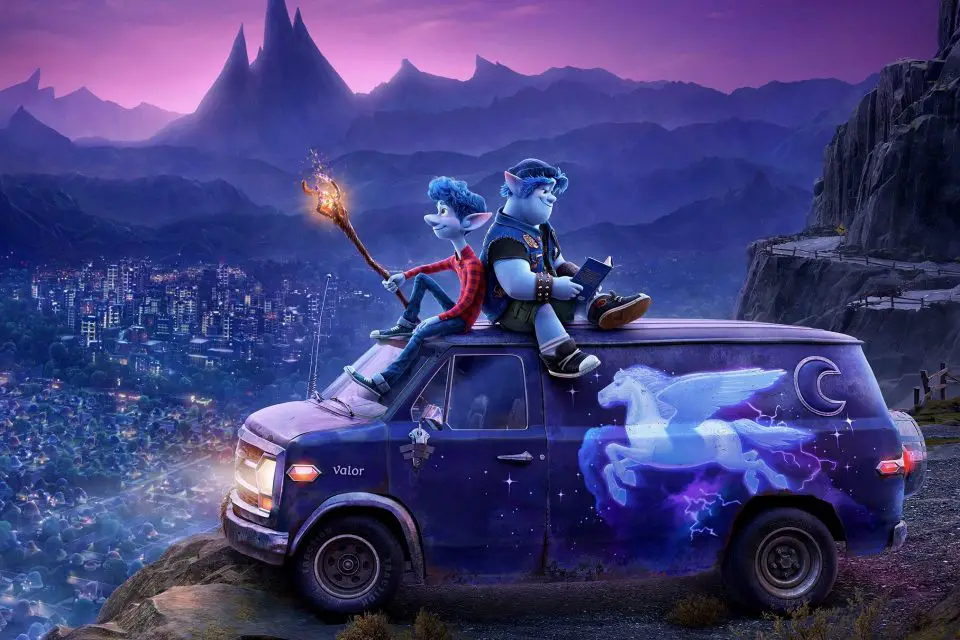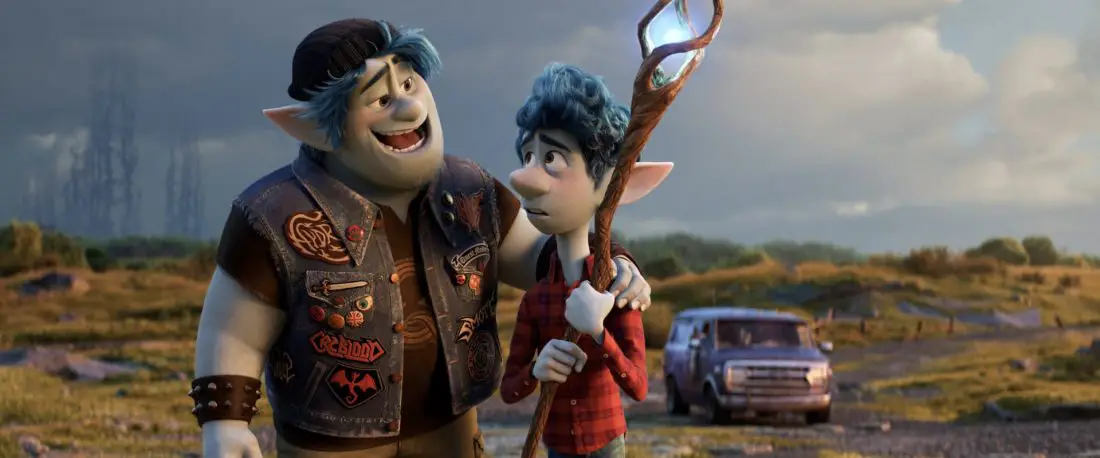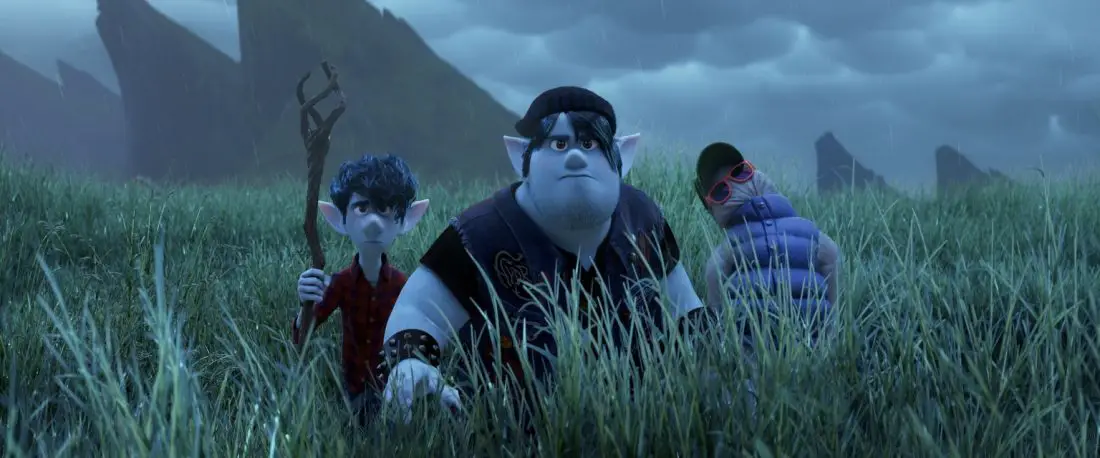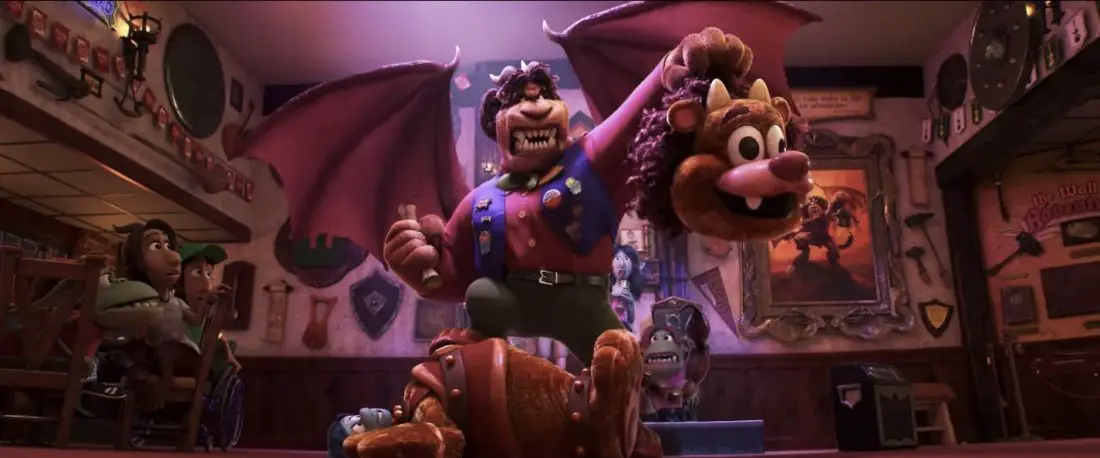‘Onward’ Review: “A Familiar & Familial Fetch Quest”

For better or worse, a new era of Pixar is upon us. No longer is it a studio that releases masterpieces on a yearly basis. Also, like the competition, its recent output relies more on pre-existing properties than something original. If there is a silver lining to this, it is that there are now many opportunities for newer storytellers to shine. With the departure of creative voices like John Lasseter and Lee Unkrich, we have the next generation leading the pack at Pixar. Chief among that pack is Dan Scanlon, a filmmaker who embraces genre conventions instead of avoiding them. His first directing effort, the underappreciated Monsters University, showed that mentality in every scene. And as it turns out, his most recent film, Onward, outright confirms it.
Naturally, this embrace is apparent as Scanlon and co-writers Keith Bunin and Jason Headley provide the fundamental narrative beats. In a world where modern technology is used more than magic, two elf brothers named Ian (Tom Holland) and Barley (Chris Pratt) receive a magic staff and gem. With the help of a certain spell, this can get them to communicate with their deceased father for one day. But since neither has used magic in reality, they destroy the gem in the process. As a result, they only manage to bring back the father’s lower half. So it is up to Ian and Barley to go on a journey to find a new gem in order to talk to their father for one last time.
If that premise sounds familiar, that’s because it is. Once you look past the world-building, the plot of Onward is nothing more than a simple fetch quest. But Scanlon and company are not satisfied with using this basic story trope just to create something functional. What makes this fetch quest interesting is that it is essentially one of Barley’s much-loved role-playing games brought to life. All the game spells that Barley uses have the same effect in the real world. Furthermore, the monsters and lore of the games correspond with something that exists around the main characters. Because of this, we have protagonists that can actually engage with what is required of them.
This brings us to, perhaps the story’s most prominent element: the relationship between Ian and Barley. While they are brothers, they are much different in terms of personalities. Ian is cautious to the point that he cannot interact with anyone without having anxiety. Meanwhile, Barley is far from cautious as one can get, as he carelessly drives his van around town. Therefore, being each other’s company allows them to learn their strengths and weaknesses and use them in actual scenarios. And given that they have to take care of their father’s lower half throughout, those chances are plentiful.
As with the central premise, the contrasting dynamic between characters is nothing revelatory. After all, mismatched pairs in a Pixar movie have existed since the original Toy Story. But once again, the filmmakers balance this lack of invention with an abundance of terrific execution. Between the lively animation and youthful voice work, Ian and Barley feel like genuine and well-rounded individuals. While neither Holland nor Pratt is covering new ground, their boyish qualities still come through their voices with little issues. Furthermore, the buoyancy of their movements allows them to be appealing on a visual level. Even in situations where the narrative stops to show off its fantastical world, Onward offers characters that keep things compelling.
More importantly, Scanlon uses basic character development to the film’s advantage. As much as the destination is about the two interacting with their father, the journey itself is really about the two interacting with each other. To exemplify this, Scanlon stages certain moments in the climax in rather oddball ways. Specifically, he stages a pivotal scene between Barley and his father so that the perspective is far away from the action. This moment is so obscured that it feels like Scanlon wants you to care more about a major scene preceding it. Thanks to this unconventional decision, he delivers the movie’s true message: reaching milestones with a family member counts for a lot, even if it’s not with who you expect.
Of course, Onward has more on its plate than its wonderful depiction of brotherly love. Best of all, it utilizes its hybrid world to craft some deeply amusing comedy. For one thing, it pokes fun at how modern generations trivialize ancient legends. One can see this in the extended restaurant scene, where important historical facts appear in a kids’ menu and nowhere else. Also, it gets a lot of mileage out of using spells for fun visual gags. In one sequence, Ian and Barley use a spell to disguise themselves as a police officer so they can easily interact with other officers. By the time we get to a dragon resembling Ian’s school mascot, it works enough as a comedy that it can almost function without the more dramatic elements.
But given that the final product does have those dramatic bits intact, it would be a shame to lose something so emotionally resonant. By design, Onward is a low-key effort for the studio that never tries to aim for profundity. In spite of that, Scanlon’s voice has the magic to make conventional beats into effective comfort food. Prior to seeing this, I never thought a movie with a fetch quest of the familiar and familial would strike such a chord. Yet nothing could be further from the truth: it is a family film that wisely treats familial bonds with the utmost importance. If that’s not what counts as quality cinema, I don’t know what does. – Mark Tan
Rating: 8/10
Onward will release in theaters on March 6, 2020.
The film stars Tom Holland, Chris Pratt, Julia Louis-Dreyfus, Octavia Spencer, Mel Rodriguez, and Lena Waithe.






